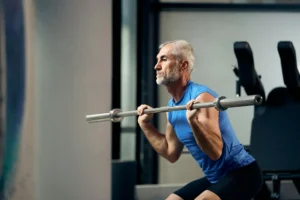Shoulder Replacement Surgery: What is the Success Rate?
Shoulder replacement surgery can be a life-changing procedure that aims to alleviate pain and restore function in individuals with severe shoulder conditions. It involves removing damaged parts of your shoulder and replacing them with artificial components. Let’s take a closer look at this procedure and what its success rate looks like.
With how significantly shoulder implant technology has improved over the years, the longevity of our implants is excellent. As a shoulder specialist, it has been exciting to see the evolution and the progression of this technology and help people get back to their active lifestyles.
The Need for Shoulder Replacement Surgery
There are several reasons why someone might need shoulder replacement surgery, including arthritis, injury, inflammatory arthropathy, posttraumatic arthritis, certain fracture scenarios, and other less common issues. When all conservative, non-operative measures have been exhausted, then I talk to my patients about surgery to successfully repair the damage.
Through this procedure, I replace the damaged parts of the shoulder joint with artificial components or implants. As a fairly conservative surgeon, I only suggest surgery as a last option when we are sure that other treatments will no longer work.
Improvement in Surgical Technology
As technology has improved, we’ve developed the ability to use CT images to gain a better understanding of the three-dimensional geometry of each patient’s unique shoulder. I utilize these tools to assist in the surgical planning process as much as possible because I have found with it, we are able to perform a more accurate and customized surgery for each patient.
Success Rate of Shoulder Replacement Surgery
The success rate of shoulder replacement surgery is generally high. Studies are showing that 90-95% of individuals experience substantial improvement in pain and function following the surgery. The 10-year survival rate is 96%.%. Many patients end up with extremely functional shoulders and they are able to return to their daily activities and lifestyles without pain.
How long does it take to recover from a shoulder replacement?
In general, I tell patients that full recovery can take about 3 to 6 months. At 3 months post-op, most restrictions are lifted, and people can begin trying to adapt back to their lifestyle.
Factors Influencing Success Rate
Several factors can influence the success rate of shoulder replacement surgery, including the patient’s overall health, the extent of shoulder damage, the quality of post-surgery rehabilitation, and the surgeon’s experience.
Literature studies are showing that complications with shoulder surgery can be minimized if patients begin by seeing a shoulder trained surgeon who doesn’t focus on knee or hip or other conditions, but spends their time dedicated to the shoulder. Due to the complexity of the shoulder joint, having a shoulder specialist who is constantly expanding their knowledge base and technology, is a large factor to the success of shoulder replacement surgery.
Recovery and Rehabilitation
Recovery and rehabilitation play crucial roles in the success of shoulder replacement surgery. A comprehensive rehabilitation program, including physical therapy, is necessary to regain strength and mobility in the shoulder.
Around 2 weeks after a shoulder replacement surgery, physical therapy begins, helping patients progress so that they can successfully regain their motion and strength in the shortest amount of time possible. In general, I tell patients that full recovery can take about 3 to 6 months. At 3 months post-op, most restrictions are lifted, and they can begin adapting back to their normal lifestyle with their new shoulder.
Shoulder replacement surgery has a high success rate and can significantly improve the quality of life for individuals suffering from shoulder pain and loss of mobility. The success rate is highest when the factors addressed in this blog are reached as best as possible. Those include carefully selecting a surgeon who has specializes in treatment of the shoulder and following the protocol after surgery.
If you’re looking for a shoulder specialist, please schedule an appointment with me.





